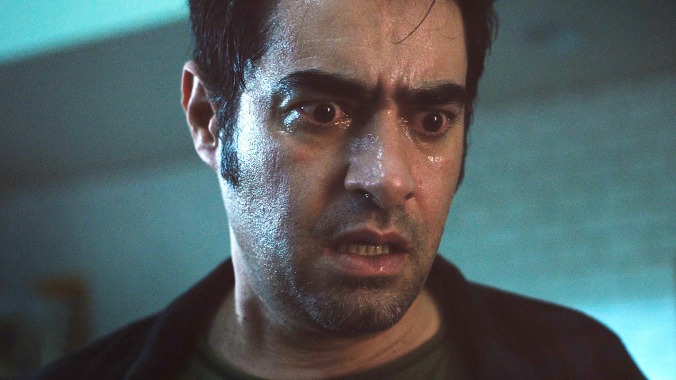

Note: The writer of this review watched The Night on a digital screener from home. Before making the decision to see it—or any other film—in a movie theater, please consider the health risks involved. Here’s an interview on the matter with scientific experts.
If you’re going to set your movie in a haunted hotel, you may as well set it in a hotel that’s actually haunted. Do a quick Google search and you’ll find that Los Angeles’ Hotel Normandie, a local landmark built in 1926, has plenty of spirits in its past. The eeriness of its history, combined with the persistent and invasive buzz of its huge neon sign, makes it the perfect setting for The Night, a Farsi-language horror thriller that’s foremost about the unwelcome memories that arise when sleep is as elusive as the sunrise.
Kourosh Ahari’s debut feature, the first U.S. production approved for theatrical release in Iran since 1979, stars Shahab Hosseini (A Separation) and Niousha Jafarian (Here And Now) as Babak and Neda, a married Iranian American couple fraying at the edges. All that seems to bind them is their 1-year-old daughter and a set of interlocking tattoos—one for him, one for her—that unite to make a single symbol. A broken GPS and a buzzed Babak convince the pair to shack up at the Normandie after a tense night with friends, but neither is able to find sleep as the cries of their child intermingle with that infernal neon and a general air of dread. They’ve ignored the unspoken tension eating away at their union for too long, and it’s now going to consume their reality.
The Night is plenty disquieting even before Babak and Neda begin hearing noises on the roof and voices in the hall, with Hosseini ably channeling the weary and despairing frustration of chasing sleep on an endless night. Truly, some of the film’s most compelling scenes unfold against the actor’s prone face, eyes closed and struggling to ignore the sounds, both natural and unnatural, that fill his cramped hotel room. Sound, as it turns out, is The Night’s secret weapon, deployed via composer Nima Fakhrara’s violent atonal strings or Ahari’s nerve-shredding aural mix, which suggest horrors more ominous than anything we’re actually seeing.
The Normandie, too, looks pretty unnerving through the lens of cinematographer Maz Makhani, who drapes its vacant, unassuming interior in otherworldly sheets of neon and shadow. There’s allusions to The Shining to be made, specifically as it pertains to the impact of isolation and unfamiliarity on a marriage, but the hotel is less Overlook than a 21st-century version of Barton Fink’s The Earle. The sensation that it’s been long abandoned is both eerie and hard to shake, and, like Steve Buscemi’s Chet, the oddball at the front desk (George Maguire) feels beamed in from some other reality.
That surreality works on an aesthetic level, but as in The Babadook, the dreamlike scares are psychological to a fault. Ahari’s script is perhaps too focused on the secrets of its central couple, which are compelling but foreshadowed in a belabored way. By the end, the emotional catharsis is dulled somewhat by the sheer obviousness of it all, not to mention the convoluted route Ahari takes to get there. More interesting are the scenes in which the filmmaker reckons with the couple’s uneasy assimilation into American culture. The few characters we do see inside the hotel represent uniquely American anxieties; a police officer, for example, seethes with a clear distrust of foreigners, though that doesn’t stop him, or the hotel’s clerk, from lavishing unwanted attention on the couple’s child. Similarly, the significance of Babak’s and Neda’s tattoos feel underexplored, especially given that tattoos have, in recent years, become a statement of identity in Iranian culture. The external struggles are perhaps more compelling than the internal ones.
Still, The Night remains an impressive debut from Ahari, a filmmaker with a talent for textures, both visual and sonic. He’s also got the good sense to end The Night at the perfect moment, its ambiguous epilogue giving way to a final shot that illuminates as much as it unsettles. Given the filmmaker’s penchant for woozy tracking shots and prolonged spells of uneasy silence, it might leave you feeling as in need of a nap as the characters. If so, take to heart the old adage that Babak and Neda clearly didn’t: “Don’t let the sun go down on your grievances.”
8 Comments
“you may as well set it in a hotel that’s actually haunted”s/that’s actually/that has a reputation as being
Dunno how to break this to you, my dude, but we all know that ghosts are not actually real.
Well, except Randall, evidently.
Pfft. Fake news. If ghosts aren’t real, why do they always hog the dryers at the laundromat?
The mere mention of ghosts on kinja always brings out some first year atheist who has to let everyone know that he’s Very Rational. They’re worse than vegans.
“Barton Fink! Barton Fink!”
“Wallace Beery! Wrestling picture! Whaddya need, a roadmap?!”
I hate that “never let the sun go down on an argument” thing. I used to prescribe to it and my life has gotten so much better since I stopped. Nothing like a good night’s sleep for two people to realize they were being stupid and apologize.